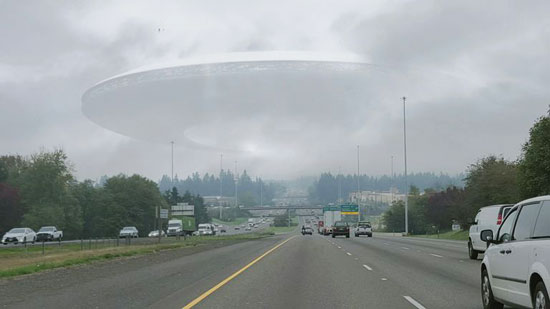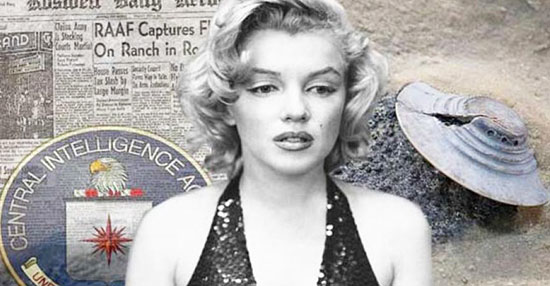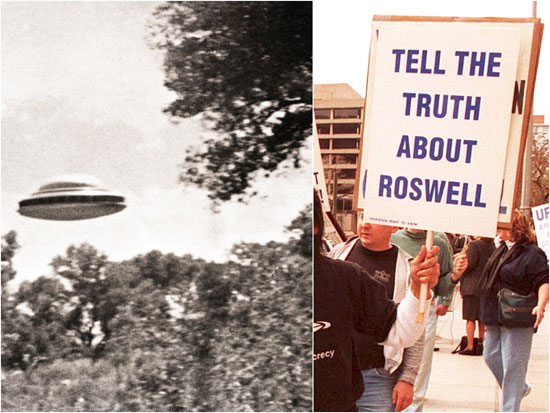UFO Hoaxes: When Things Get Complicated – Official Secrecy, Bad Evidence Analysis and Hoaxers Make Personal Discernment Very Important
Stillness in the Storm
The following is an article discussing the debate between genuine and authentic UFO sightings. Ufology does a commendable job at recording UFOs, gathering documents, and compiling insider/whistleblower testimony, but it seems to be lacking insofar as how this information is analyzed and interpreted.

Anyone who has studied ufology in detail quickly realizes there is great disagreement in the field – some researchers contend all UFO sightings are extraterrestrial in origin, others say that the bulk of sightings are secret government projects, and still others suggest they are outright hoaxes by people who want to discredit believers.
There seems to be a healthy mix of all three. But moreover, the notion of a secret space program and the government-sponsored cover-up of UFOs and related phenomena makes this issue of discerning the information presented by ufology even more critical.
Despite disagreements of experts in ufology, a clear case for the existence of secret space programs can be made.
As a part of those programs, the use of official secrecy is also apparent.
Consider the following:
In Dr. Michael Salla’s book Insiders Reveal Secret Space Programs & Extraterrestrial Alliances, Unacknowledged Special Access Programs (USAPs), are discussed in which participants are given authority to hide their activities from the public. Waived USAPs are a more secretive set of programs not required to report any of their activities or existence for congressional oversight.
In these deep-black projects, oral briefs are provided to read-in persons only – those individuals who have a valid need to know. Participants are authorized to deny the existence of these programs under any circumstances, including congressional subpoena, and are provided a cover story to hide the project’s existence.
A supplement to the DoD manual related to special access programs states that cover stories can be generated with the goal of hiding a program’s true purpose.
Program Cover stories. (UNACKNOWLEDGED Program). Cover stories may be established for unacknowledged programs in order to protect the integrity of the program from individuals who do not have a need to know. Cover stories must be believable and cannot reveal any information regarding the true nature of the contract.
This suggests that there were most likely two sets of secret programs, one that was designated deep-black or USAP, and an acknowledged project that would draw public attention.
In effect, unacknowledged programs not only outright lie to the public but they also develop elaborate cover stories to deceive researchers.
For example, in the film Mirage Men, Richard Doty is exposed as a disinformation agent, who worked for the U.S. Air Force Office of Special Investigations (AFOSI) stationed at Kirtland Air Force Base in Albuquerque, New Mexico. During his time there in the 1980s, he was apparently supplying hoaxed documentation to various ufologists in an effort to discredit certain figures in the field. And Doty was largely successful.
Likely, this is not the only example of disinformation.
What’s worse is that established ufologists can sometimes reject new information that goes against their entrenched theories, muddying the waters even further with ad hominem attacks and dubious arguments.
There is still a heated debate focused around an alleged secret space program insider, Corey Goode. While Goode offers no evidence to support his claims, his dissenters and those trying to debunk his story fail to prove it a hoax, often resorting to character assassination attempts instead of focusing on Goode’s claims. The debate highlights the deficit in proper analysis and objective assessment within the field, as some presenters are clearly trying to maintain their narratives amid the emergence of new information.
Moreover, there are some researchers who do not seem to understand how to confirm a claim with evidence, and as a result, tend to overemphasize one data point or another, sometimes relying on corroboration with other unproven data points as proof their claims are valid. The overall effect is incredibly befuddling for the growing throngs interested in answering the question: Are we alone in the universe?
In general, there appears to be a well-coordinated effort to marginalize UFO and extraterrestrial researchers, including one effort focused around dividing the community against itself. As a result, it is of paramount importance for those who research these topics to develop proper discernment.
The writer below asserts that some of the more well-known topics in ufology are hoaxes, which has the tendency to trigger some in the field such that they become irrational. From the point of view someone who studies psychology, philosophy, and the science of how we come to know the truth, it is important for us to learn how to objectively analyze claims of all types, be they claims of a hoax or authentic sightings.
Briefly, a claim is a statement or question that describes reality. In order to determine if the claim is true, one needs to analyze what it says and gather evidence within the scope or context of what is described. Lack of evidence doesn’t mean the claim is true – it just means it can’t be confirmed. And most importantly, just because a claim sounds unbelievable – to us – doesn’t mean it is untrue either. Conversely, just because a claim “resonates” or feels right doesn’t mean it is true. The bottom line is that in order to know whether a claim is accurate, one needs to measure what it really is, which quickly highlights falseness and deception.
For example, you can tell if the weather prediction was right by going outside to observe the climate yourself. But until you do, you can’t know, with precision and objective certainty, that a claim is true or not.
For those seeking confirmation of claims in ufology, direct substantiation via evidence is often not possible. In most cases, researchers have unverifiable claims, speculation and uncertainty to work with. Thus, our ability to properly assess a claim, and not blindly believe or blindly reject it out of hand, is of great value.
In conclusion, while many would like quick easy answers when it comes to the UFO question, there just isn’t enough hard evidence to work with in almost all cases. Moreover, with hoaxers, disinformation agents, and less than objective experts out there, the need to develop our own personal discernment skills is overwhelming.
The good news is that while this places a large burden of responsibility on our shoulders, when we do develop personal discernment skills, we become more immune to deception. That’s one benefit well worth the effort.
UFO Hoaxes: When Things Get Complicated
by Nick Redfern

These three articles on questionable documents (one on Marilyn Monroe, the second on the Rendlesham Forest, and the third on weird goings-on in 1940s-1950s Chicago) provoked a handful of emails in response. But, they weren’t quite the responses I was anticipating. With hindsight, though, maybe I should have expected them. Of the eleven people who contacted me, not a single one took the view that the documents were nothing but hoaxes perpetrated by people within the field of Ufology (which, in my view, is the most likely of all the explanations, even though I’m slightly open-minded on the Marilyn document, but as for the other two: pure waste).
Rather, all eleven only served to complicate things even further by suggesting that the hoaxes just had to be the work of – as one person worded it – “government agents.” Not sad figures with too much time on their hands and a lack of what is known as a social-life, after all?
Terms like “disinformation,” “counterintelligence” and “psychological warfare” were tossed around, as a means to explain to me and justify why these were not just time-wasting hoaxes. So, in a roundabout way, by highlighting the three questionable documents referred to above, I inadvertently added to – or, at the very least, encouraged – the conspiracy theories, rather than laying them to rest.

The U.S. Government describes psychological warfare as, “The planned use of propaganda and other psychological actions having the primary purpose of influencing the opinions, emotions, attitudes, and behavior of hostile foreign groups in such a way as to support the achievement of national objectives.” Then, there is the matter of disinformation – a word which pops up regularly in the UFO field. English Oxford Living Dictionaries says of disinformation that it is, “False information which is intended to mislead, especially propaganda issued by a government organization to a rival power or the media.”
And there is this from Wikipedia: “Historically the word ‘disinformation’ has been reserved for a body of false information propagated at the state and state secret services level but in recent times it has a looser meaning in English relating to propaganda, fake news or a body of lies by any organization and possibly any individual.”
As for counterintelligence, Merriam-Webster states that it amounts to the “…organized activity of an intelligence service designed to block an enemy’s sources of information, to deceive the enemy, to prevent sabotage, and to gather political and military information.”
Now, it’s important to note that counterintelligence, disinformation, and psychological warfare certainly have played significant roles in the domain of Ufology. Take, for example, the saga of Paul Bennewitz, whose life was ruined when he got too close to something that certain figures in the world of government were determined to keep him away from. The same might be said when it comes to the multiple explanations put forward to explain the Roswell affair of July 1947.
So, in light of all this, yes, the three documents referred to above could have been the work of people in government; people who were skilled in the arts of disinformation and counterintelligence. But, what intrigued me most, from reading the emails, was the clear yearning for the documents to be more than merely someone’s obscure prank.
The wording of several of the people who emailed me made it abundantly obvious that they wanted the documents to be more than just the results of a bit of cut-and-pasting and photocopying in mommy’s basement. Why? The excitement factor, I suppose. If that’s the kind of thing that excites you, of course.
Ufologists have achieved great things over the years and decades. But, sometimes – in fact, I would say, more than often – ufologists have been guilty of over-thinking a situation when, in reality, the most likely and down-to-earth explanation is the correct one.
yogaesoteric
July 24, 2019
